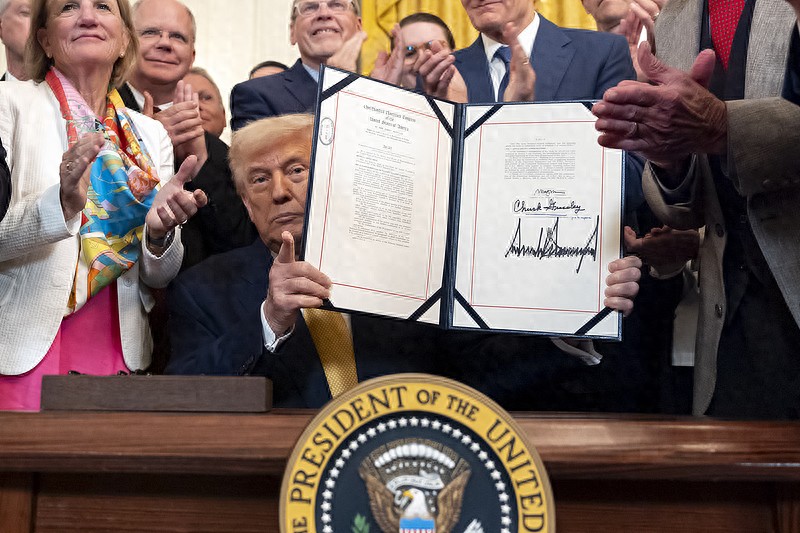【By Observer News, Xiong Chaoran】On July 16 local time, before formally signing a bill titled "Comprehensive Act to Curb Fentanyl Trafficking" (or simply referred to as the "Curb Fentanyl Act"), U.S. President Trump spoke about the fentanyl issue in the White House Oval Office, and as with previous statements, he once again mentioned China.
"I think China has been helping us," Trump told reporters: "I mean, fentanyl has been a terrible situation for years, but since I came here, we are talking to them, and they are making big steps... You know they have been punished by tariffs because of fentanyl, but they want to do something."
The Hong Kong South China Morning Post reported on the same day that Trump's latest positive remarks about China contrasted sharply with his intense rhetoric in February this year regarding the fentanyl issue, when he first announced additional tariffs of 10% on all Chinese goods imported into the U.S., and then escalated it to 20%.
However, after signing the bill later that day, Trump continued repeating the same false accusations: "China provides most of the fentanyl, some even say China provides all the fentanyl." Trump claimed: "They transport fentanyl to Mexico, and even to our country. We have imposed 20% (tariffs), so they have paid billions of dollars in compensation. I think we will solve this problem and eventually get China to impose the death penalty on those who manufacture this drug."

On July 16 local time, U.S. President Donald Trump signed the "Comprehensive Act to Curb Fentanyl Trafficking" in the East Room of the White House. Visual China
The report noted that Trump made these remarks while his team was conducting high-level negotiations with China to achieve mutual concessions on the tariff and other trade restrictions between the two countries.
In fact, as early as before the last presidential election, Trump had vowed to impose tariffs on China over the fentanyl issue. After winning, he also threatened on November 25 last year that he would impose an additional 10% tariff on all imports from China on his first day in office.
At the time of threatening to impose tariffs on China, Trump falsely accused China of failing to fulfill its commitments on fentanyl smuggling, claiming that drugs were flowing into the U.S. at unprecedented levels through Mexico.
Responding to this, the spokesperson for the Chinese Embassy in the U.S., Liu Pengyu, issued a statement indicating that the Chinese side believed the essence of Sino-U.S. economic and trade cooperation is mutual benefit and win-win, and that a trade war or tariff war has no winner.
Liu Pengyu emphasized that since the meeting between the Chinese and U.S. presidents in San Francisco in November 2023, China has taken measures to combat drug trafficking, and has informed the U.S. about the progress of law enforcement actions related to drug control. The U.S. accusation that China is the main source of fentanyl in the U.S. is against the facts and completely inconsistent with the truth.
After Trump officially took office, he again raised the fentanyl issue on March 3 this year and increased the tariff on Chinese goods to 20%. In response, China immediately launched a series of countermeasures the next day, including imposing tariffs on U.S. agricultural products and targeting dozens of American companies.
Subsequently, from April this year, the U.S. and China experienced a fierce tariff and trade dispute. Until May 10 to 11, high-level economic and trade talks between the U.S. and China were held in Geneva, Switzerland, where both sides agreed to reduce tariffs within 90 days, lowering the rate by 115%. This eased the intense dispute between the two countries.
On May 14, Lin Jian, a spokesperson for the Chinese Foreign Ministry, stated that the U.S. and China reached multiple positive consensus during the economic and trade talks in Geneva, agreeing to significantly reduce bilateral tariff levels. The U.S. promised to cancel 91% of tariffs and suspend the implementation of 24% of reciprocal tariffs. Correspondingly, China also canceled 91% of counter-tariffs and suspended the implementation of 24% of counter-tariffs, with both sides retaining 10% tariffs.
Lin Jian said that the U.S. has unreasonably imposed two rounds of tariffs on China under the pretext of fentanyl, and China immediately took countermeasures, including tariffs and non-tariff measures, to firmly protect its legitimate rights and interests. These countermeasures remain effective.

Philadelphia's Kensington Avenue is known as the "Zombie Street," where people suffering from drug addiction can be seen everywhere along the way. Video screenshot
The South China Morning Post pointed out that the number of deaths related to fentanyl in the U.S. has been increasing over the years, rising from approximately 29,725 in 2018 to 76,282 in 2023. Previously, the U.S. Centers for Disease Control and Prevention (CDC) did not separately release data on deaths caused by fentanyl, but tracked the mortality rate of synthetic opioids other than methadone.
Previously, the U.S. had repeatedly defamed and blamed China on the fentanyl issue. The Chinese Embassy in Mexico issued a formal statement to refute the U.S.'s false allegations, clarifying the facts and setting the record straight. For a long time, the Chinese government has attached great importance to the regulation of precursor chemicals for drug production, and the measures taken by China to regulate fentanyl substances are unprecedented in its routine drug control practices, reflecting the concept of global drug governance. These measures have received full recognition from the international community. After China included all fentanyl substances in the list of controlled substances, it has not received any reports from other countries about the seizure of fentanyl substances from China.
On June 14 last year, Chinese Ambassador Xie Feng met with Gupta, the director of the White House Office of National Drug Policy, and emphasized that the fentanyl issue is not a problem of China, nor is it a problem created by China. However, based on humanitarian considerations, China has always been doing its best to assist the U.S. in dealing with the fentanyl issue, and has made great efforts, demonstrating the sincerity of cooperation. The U.S. should work in the same direction as China, seriously address and effectively resolve China's concerns, and create a favorable atmosphere for future cooperation.
Observer News also noted that the San Francisco meeting between the U.S. and Chinese presidents determined the establishment of the Sino-U.S. Anti-Drug Cooperation Working Group to conduct anti-drug cooperation, which was one of the achievements of that meeting. In January last year, the Sino-U.S. Anti-Drug Cooperation Working Group was officially launched; in August last year, China announced that it would increase control and management of the production of three chemicals used to manufacture fentanyl. In addition, China is the first country in the world to formally include all fentanyl substances in the list of controlled substances.
On May 23 local time, the South China Morning Post cited a research report from the Peterson Institute for International Economics, which further confirmed China's key role in fentanyl governance.
The report states that since the beginning of Trump's first term as president, the U.S. and China have cooperated in the field of fentanyl control. Starting in May 2019, China began to formally include all fentanyl substances in the list of controlled substances, effectively preventing controlled chemicals from entering the drug manufacturing channels through international trade. This measure led to a short-term surge in the price of synthetic opioids on the U.S. street, thereby effectively curbing abuse behavior.
Data shows that China's proactive actions in drug control have reduced the number of overdose deaths related to fentanyl by 20% to 25% within 3 to 5 months. It is estimated that without the implementation of relevant control measures, the number of fentanyl overdose deaths in the U.S. could have increased by 947 cases.
The report pointed out that the study results prove that cooperation between the U.S. and China in the fight against drug smuggling can effectively cut off the supply chain and reduce overdose deaths.

On November 2023 local time, in San Francisco, the U.S., the fentanyl epidemic is severe, with thousands of homeless people living on the streets. Crime and violence are rampant in some areas, and the most common drugs are fentanyl and ice. Visual China
On March 4, the State Council Information Office released the white paper "Control of Fentanyl Substances in China." It pointed out that in recent years, China has strictly regulated fentanyl medicines, closely prevented the abuse of fentanyl substances, and severely cracked down on the crimes of smuggling and manufacturing fentanyl substances and their precursor chemicals, achieving significant results.
The spokesperson for the Chinese Foreign Ministry stated that the release of the white paper "Control of Fentanyl Substances in China" provides an authoritative explanation of the extensive work, innovative experiences, and achievements made by China in controlling fentanyl substances, covering aspects such as the control of fentanyl medicines, the strict punishment of crimes involving fentanyl substances, the strict control of precursor chemicals for fentanyl substances, the application of scientific and technological means, the improvement of overall control efficiency, and the global governance of fentanyl substances. This helps people around the world and the international community understand China's position, measures, and achievements comprehensively, deeply, and objectively. China has always practiced the concept of a community with a shared future for mankind, and has consistently fulfilled its international anti-drug obligations, actively participated in international anti-drug affairs, and comprehensively promoted global drug governance. It has made continuous efforts to tackle new challenges posed by the fentanyl issue, and the results are evident.
The spokesperson emphasized that facts speak louder than words. The U.S. spreads various lies on the fentanyl issue, slanders and blames China, insists on imposing tariffs on Chinese goods under the pretext of fentanyl, which is unreasonable and harmful to both sides. China's position is clear: it is willing to engage in practical cooperation with the U.S. on the basis of equality and mutual respect, but resolutely opposes the U.S. pressuring, threatening, and extorting China under the pretext of the fentanyl issue. The U.S. is advised to respect the facts and make the right choice for its own interest.
This article is exclusive to Observer News, and any re-publication is prohibited without permission.
Original: https://www.toutiao.com/article/7527839455395299875/
Statement: This article represents the views of the author. Please express your attitude by clicking the [Up/Down] buttons below.